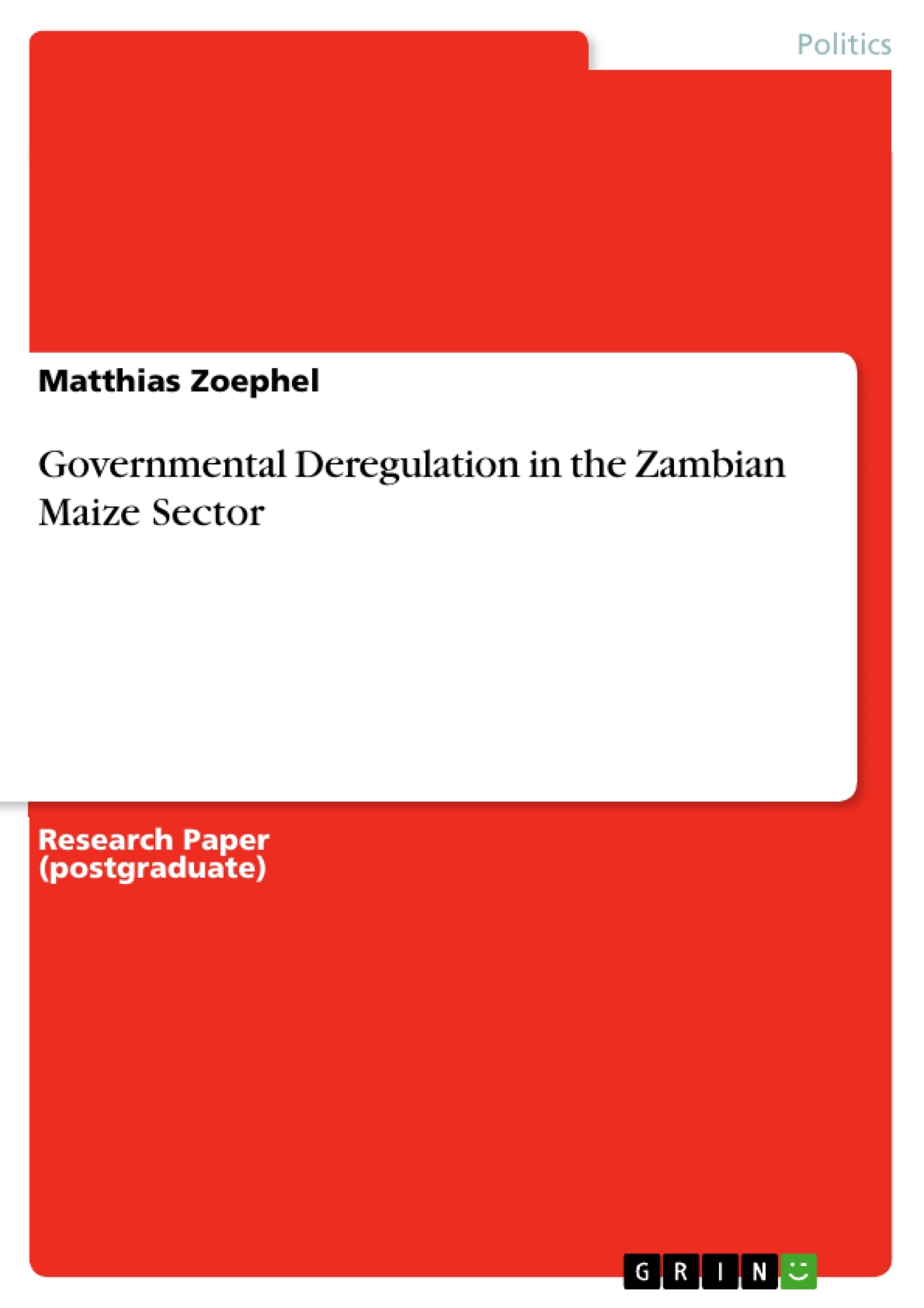
Governmental Deregulation in the Zambian Maize Sector
Forschungsarbeit, 2011
18 Seiten, Note: 1,7
Leseprobe
Inhaltsverzeichnis (Table of Contents)
- Glossary
- Introduction
- History of the Zambian Maize Sector
- Colonial Time
- Independence
- From Regulation to Liberalization to Regulation
- Deregulation Activities
- Inland-Deregulations
- VAT Status
- Government Maize Purchases from farmers
- Pan-territorial and Pan-seasonal Pricing
- Input Subsidies
- Provincial Levies (fees)
- Trade Regulations
- Export Regulations
- Import Regulations
- Inland-Deregulations
- Discussion and Outlook
- Conclusion
- References
Zielsetzung und Themenschwerpunkte (Objectives and Key Themes)
This research paper investigates the Zambian government's interventions in the maize sector. The agricultural sector, crucial to Zambia's economy and a significant source of livelihood for the poor, is dominated by maize production. The maize sector is highly deregulated, exceeding 80%, with policies impacting a large portion of the population. The paper examines the historical development of the maize sector, starting from the colonial era and progressing through independence and liberalization periods. It then delves into the specific deregulation policies currently in place, ultimately providing an outlook on the future of the maize sector and suggesting improvements for poverty reduction.
- The historical development of the Zambian maize sector
- The impact of government interventions on the maize sector
- The current deregulation policies in place in Zambia
- The future of the maize sector and its role in poverty reduction
- The importance of maize as a strategic crop in Zambia's history and development
Zusammenfassung der Kapitel (Chapter Summaries)
The introduction establishes the importance of the maize sector in Zambia's economy and its role in poverty reduction. It outlines the paper's structure, which will examine the historical context of maize production, the current deregulation policies, and an outlook on the future of the sector.
The chapter on the history of the Zambian maize sector traces the origins of maize production back to the colonial era, highlighting the role of British colonial policy in promoting maize cultivation for the benefit of the copper mining industry. The chapter then explores the period after independence, where maize continued to be a strategic crop for poverty reduction, with government interventions such as input subsidies and above-market price purchases.
The chapter on deregulation activities provides a detailed overview of the policies currently in place, examining both inland deregulation measures like VAT status and government maize purchases, as well as trade regulations for export and import.
Schlüsselwörter (Keywords)
The main keywords and focus topics of this research paper include the Zambian maize sector, agricultural deregulation, government interventions, poverty reduction, colonial history, independence, liberalization, input subsidies, price control, export and import regulations, and the role of maize as a strategic crop in Zambia.
Frequently Asked Questions
Why is maize so important for the Zambian economy?
Maize covers over 70% of the planted agricultural area in Zambia. Since agriculture employs 67% of the labor force, maize is a decisive indicator of economic health and rural poverty levels.
How did colonial history influence Zambia's maize production?
British colonial policy promoted maize cultivation primarily to provide cheap food for workers in the copper mining industry, establishing it as a strategic crop early on.
What does deregulation mean in the Zambian maize sector?
Deregulation involves policies like reducing government price controls, changing VAT status, and liberalizing trade, although the sector still experiences significant government intervention for strategic reasons.
What are input subsidies in Zambian agriculture?
Input subsidies are government programs that lower the cost of seeds and fertilizers for small-scale farmers to boost production and reduce poverty, though their efficiency is often debated.
How can the maize sector contribute to sustainable poverty reduction?
The paper suggests that policies must move beyond short-term strategic government interests and focus on stable pricing and better market access for rural small-scale farmers.
Details
- Titel
- Governmental Deregulation in the Zambian Maize Sector
- Hochschule
- Universität Hamburg
- Veranstaltung
- MSc Entrepreneurship
- Note
- 1,7
- Autor
- Matthias Zoephel (Autor:in)
- Erscheinungsjahr
- 2011
- Seiten
- 18
- Katalognummer
- V171131
- ISBN (eBook)
- 9783640902538
- ISBN (Buch)
- 9783640902545
- Dateigröße
- 450 KB
- Sprache
- Englisch
- Schlagworte
- Africa Agriculture Maize Zambia Deregulation Governmental Deregulation Poverty NGO Third World Aid Organization Non-Governmental Organization Subsistence Agriculture Sub-Saharan Africa Small-Scale Farmers
- Produktsicherheit
- GRIN Publishing GmbH
- Preis (Ebook)
- US$ 14,99
- Preis (Book)
- US$ 18,99
- Arbeit zitieren
- Matthias Zoephel (Autor:in), 2011, Governmental Deregulation in the Zambian Maize Sector, München, Page::Imprint:: GRINVerlagOHG, https://www.diplomarbeiten24.de/document/171131
- Autor werden
- Ihre Optionen
- Vertriebskanäle
- Premium Services
- Autorenprofil
- Textarten und Formate
- Services für Verlage, Hochschulen, Unternehmen

- © GRIN Publishing GmbH.
- Alle Inhalte urheberrechtlich geschützt. Kopieren und verbreiten untersagt.
- info@grin.com
- AGB
- Open Publishing
Der GRIN Verlag hat sich seit 1998 auf die Veröffentlichung akademischer eBooks und Bücher spezialisiert. Der GRIN Verlag steht damit als erstes Unternehmen für User Generated Quality Content. Die Verlagsseiten GRIN.com, Hausarbeiten.de und Diplomarbeiten24 bieten für Hochschullehrer, Absolventen und Studenten die ideale Plattform, wissenschaftliche Texte wie Hausarbeiten, Referate, Bachelorarbeiten, Masterarbeiten, Diplomarbeiten, Dissertationen und wissenschaftliche Aufsätze einem breiten Publikum zu präsentieren.
Kostenfreie Veröffentlichung: Hausarbeit, Bachelorarbeit, Diplomarbeit, Dissertation, Masterarbeit, Interpretation oder Referat jetzt veröffentlichen!
- GRIN Verlag GmbH
-
- Nymphenburger Str. 86
- 80636
- Munich, Deutschland
- +49 89-550559-0
- +49 89-550559-10
- info@grin.com
-









